
Lorenzo di Piero de' Medici, known as Lorenzo the Magnificent, was an Italian statesman, banker, de facto ruler of the Florentine Republic, and the most powerful and enthusiastic patron of Renaissance culture in Italy. He was a magnate, diplomat, politician and patron of scholars, artists, and poets. As a patron, he is best known for his sponsorship of artists such as Botticelli and Michelangelo. He held the balance of power within the Italic League, an alliance of states that stabilized political conditions on the Italian peninsula for decades, and his life coincided with the mature phase of the Italian Renaissance and the Golden Age of Florence. On the foreign policy front, Lorenzo manifested a clear plan to stem the territorial ambitions of Pope Sixtus IV, in the name of the balance of the Italian League of 1454. For these reasons, Lorenzo was the subject of the Pazzi conspiracy (1478), in which his brother Giuliano was assassinated. The Peace of Lodi of 1454 that he supported among the various Italian states collapsed with his death. He is buried in the Medici Chapel in Florence.
Year 1463 (MCDLXIII) was a common year starting on Saturday of the Julian calendar, the 1463rd year of the Common Era (CE) and Anno Domini (AD) designations, the 463rd year of the 2nd millennium, the 63rd year of the 15th century, and the 4th year of the 1460s decade.

Catherine de' Medici was an Italian (Florentine) noblewoman born into the Medici family. She was Queen of France from 1547 to 1559 by marriage to King Henry II and the mother of French kings Francis II, Charles IX, and Henry III. The years during which her sons reigned have been called "the age of Catherine de' Medici" since she had extensive, if at times varying, influence in the political life of France.

The House of Medici was an Italian banking family and political dynasty that first consolidated power in the Republic of Florence under Cosimo de' Medici, during the first half of the 15th century. The family originated in the Mugello region of Tuscany, and prospered gradually until it was able to fund the Medici Bank. This bank was the largest in Europe during the 15th century and facilitated the Medicis' rise to political power in Florence, although they officially remained citizens rather than monarchs until the 16th century.

Francis II was King of France from 1559 to 1560. He was also King of Scotland as the husband of Mary, Queen of Scots, from 1558 until his death in 1560.
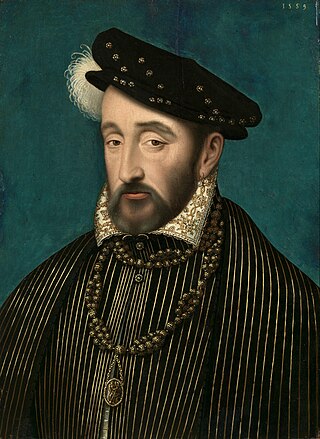
Henry II was King of France from 1547 until his death in 1559. The second son of Francis I and Duchess Claude of Brittany, he became Dauphin of France upon the death of his elder brother Francis in 1536.
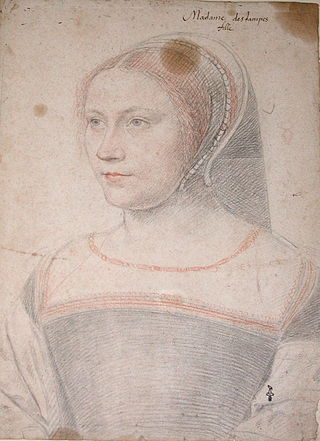
Diane de Poitiers was a French noblewoman and prominent courtier. She wielded much power and influence as King Henry II's royal mistress and adviser until his death. Her position increased her wealth and family's status. She was a major patron of French Renaissance architecture.
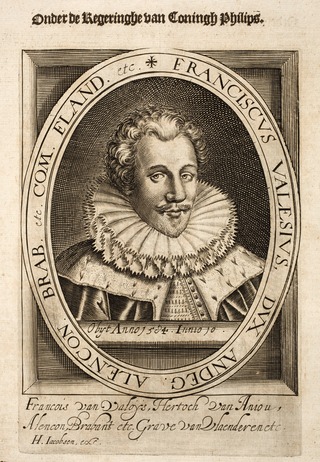
MonsieurFrançois, Duke of Anjou and Alençon was the youngest son of King Henry II of France and Catherine de' Medici.

Elisabeth of France, or Elisabeth of Valois, was Queen of Spain as the third wife of Philip II of Spain. She was the eldest daughter of Henry II of France and Catherine de' Medici.
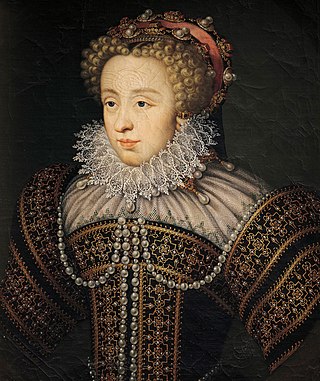
Claude of Valois was a French princess as the second daughter of King Henry II of France and Catherine de' Medici, and Duchess of Lorraine by marriage to Charles III, Duke of Lorraine.

Michael Field was a pseudonym used for the poetry and verse drama of the English authors Katherine Harris Bradley and her niece and ward Edith Emma Cooper. As Field, they wrote around 40 works together, and a long journal Works and Days. Their intention was to keep the pen-name secret, but it became public knowledge, not long after they had confided in their friend Robert Browning.

La Fronde was a French feminist newspaper first published in Paris on 9 December 1897 by activist Marguerite Durand (1864–1936). Durand, a well known actress and journalist, used her high-profile image to attract many notable Parisian women to contribute articles to her daily newspaper, which was the first of its kind in France to be run and written entirely by women. She also had experience on other reputable publications, including La Presse and Le Figaro.

Alfred Sutro OBE was an English dramatist, writer and translator. In addition to a succession of successful plays of his own in the first quarter of the 20th century, Sutro made the first English translations of works by the Belgian writer Maurice Maeterlinck.
Frederick Samuel Boas, (1862–1957) was an English scholar of early modern drama.
Walter Sydney Sichel (1855–1933) was an English biographer and lawyer, the brother of Edith Helen Sichel, of German-Jewish descent, born in London and educated at Harrow and at Balliol College, Oxford.

Jeanne d'Albret, also known as Jeanne III, was Queen of Navarre from 1555 to 1572.
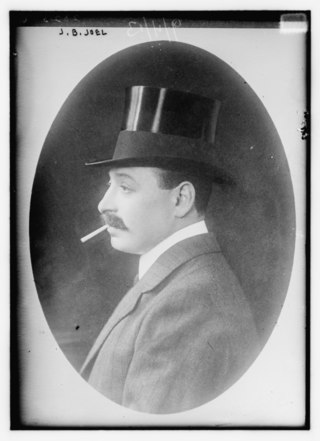
Isaac "Jack" Barnato Joel was a South African mining magnate and a champion horse breeder.

Gertrude Kingston was an actress, an English actor-manager and artist.

Isabelle de la Tour, Lady of Limeuil was a French noblewoman and a Maid of Honour to the Queen Mother Catherine de' Medici. She also formed part of Catherine's notorious "flying squadron", a group of beautiful female spies she used for the purpose of forming sexual liaisons with various powerful men at the French court thereby extracting information which would then be passed on to her. In about 1562 at Catherine's instigation, she became the mistress of Louis, Prince of Condé, brother of King Antoine of Navarre and one of the leading Huguenots in France. Two years later when Isabelle created a scandal by giving birth to his son whilst the court was on a royal progress, she was banished to a convent.
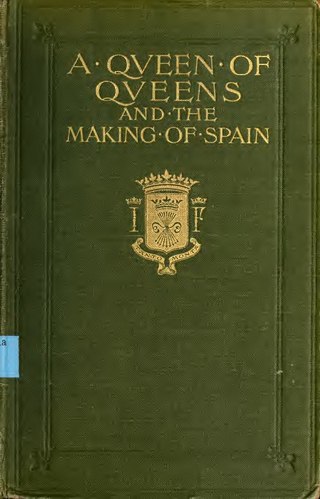
Marian Andrews was a biographer and novelist who published under the pseudonym Christopher Hare. She wrote stories set in rural Wiltshire, followed by historical fiction and biographies of fifteenth- and sixteenth-century figures, especially women, complaining that "all serious consideration was reserved for the men of the period" among other historians.

















